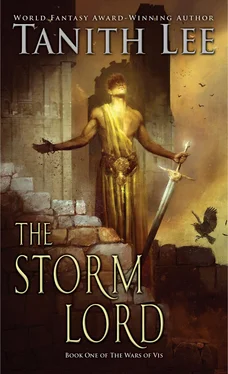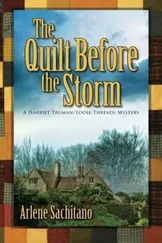“What have you done to me?” she eventually asked, the pathetic seal on her poor ignorance so thoroughly wrenched away.
He bathed the hurt and wrapped her in the blankets of the bed, and finally she fell into a dreary sleep.
He did not leave her until near dawn, when he wandered the streets of Sar as the sun rose, feeling as if some sort of murder had been committed in the dark by a man who had been his friend.
Somehow she kept from the others what he had done to her, but she kept herself from him also. And he found he was like a shamed child in her presence.
They came to Xarar at midday, showed the permit, and sheltered in a dismal eating house from a barrage of hail. The town seemed curiously inert and empty.
As they sat at the trestle over their muddy inexpensive wine, a young man came through the door, shaking hail from his cloak, cursing the weather in a colorful, altogether rather humorous way. He stayed drinking for a while, in a corner by the fire, but Raldnor was aware of his steady, dark, Xarabian gaze, and presently the Xarab rose and, bringing his wine jug with him, came and sat beside them.
“Pardon the intrusion, but I see our friend has served you the worst wine in the house. Permit me.” Whereupon he took up Raldnor’s cup, dashed the contents on the ground and refilled it from the jug. After which he repeated the performance with each of their cups in turn.
“I must protest,” Orhvan said, startled.
“Well, if you must, you must.”
“We’ve no means to repay you,” Orhvan said simply.
“I am already paid, twice over,” said the stranger, kissing Anici’s hand.
They seemed instantly in the young man’s power. He had a sorcerous personality, an indefatigable, oblique sense of fun.
He bought them dinner and they learned his name was Xaros. He was the agent, he said, of a miser in Lin Abissa. He seemed to know that they were not merely sightseers but had wares to sell, and later Orhvan took him to look at the colored cloth and the carvings and the few glazed pots that were their inventory.
“You’ll sell nothing in Xarar,” Xaros decided. “Lin Abissa’s the place.”
“We’ve had trade here before.”
“Haven’t you noticed, my friend, how empty the streets are? I see you Lowlanders get no news on the Plains. The Storm Lord is the guest of Thann Rashek at Abissa, and the whole of Xarabiss has crowded in after him to stare. At Abissa there is endless custom, therefore, from all the holiday-makers. In addition to which, my despicable master will get you a better price if you deal through him.”
“You were on the lookout, then, for Lowland traders,” Raldnor remarked.
“To be frank with you,” Xaros said, “I came to Xarar to visit a lady with whom I am slightly acquainted, at a time when I should have been on my employer’s tiresome and unimaginative errands. If you decide to deal with him, I shall use this as the excuse for my absence. Otherwise it’s the begging bowl and the open road. Don’t think for a moment, however, that I’m trying to influence any decision you might make—”
“What price could your master obtain for our work?”
“Name what you ask independently.”
Orhvan and Ras conferred and produced a sum. Xaros gave a bark of derision.
“No doubt you’re renowned for your charity, but how do you live? You’ll get three times that, even after the swindler has taken his share. And I suspect your permit’s been signed by some filthy Vis thief—some excrement of Sar, or worse, an Ommos. Think how delightful it will be to pay the vileness only the half of your expected profit, and keep the excess yourselves. Don’t be afraid. I make a very fair counterfeit bill of sale.”
It was a two-day journey to Lin Abissa. Xaros rode in their wagon. He had ridden a coal-black zeeba to Xarar, but subsequently sold it to buy his “lady” a present.
His company lifted all the sense of reserve and gloom from their party. He spread a kind of ubiquitous lightness. Raldnor found he could even be easy with Anici now, and she, beneath Xaros’s deluge of undemanding flattery, began to smile shyly and seem again like a sweet and untroubled child. Raldnor felt a warmth and a gratitude toward Xaros, but also a twisting of remorse inside himself, a pang of realization he refused to admit. The Xarabian’s freedom had been transmitted to him. Now he must ask: Might his true place be here, in Xarabiss, among Xarabians—his roots and all the leanings and cravings of his spirit and flesh? And it was Xaros who spoke it for him, the second night as they sat by the fire.
“The piece of your mother in you feels herself home.”
Raldnor stared at the flames and said: “I’ve lived a Lowlander all my life till now.”
“So the worm lives in the chrysalis till the sun bursts it. Then out pops the brilliant flying insect in amazement and mutters: ‘Well, well, I’ve lived in a chrysalis all my life till now.’”
“Not so easy to discard my father’s half, Xaros.”
“Easier than you think. The Plains breed a gentle and worthy people. Let’s admire them, but be honest. You’re not a Plains man. For one thing, I see you don’t use their mind language.”
Raldnor flinched involuntarily at this new knife piercing of the old wound. Besides, he had always heard the Lowlanders tried to hide their telepathy from the Vis. He said nothing and Xaros let him be. But his own brain took up the discussion and gnawed on it.
The first flakes of snow were feathering down as they rode through the broad red gate of Abissa. The guards, with the dragon woman of Thann Rashek’s emblem on their breasts, made much of the permit, passing it along their hierarchy to a captain, who finally came out and stood in the snow, examining their faces. At last he called to Xaros: “Will you take responsibility for these people?”
“I will. But what need? As you can see, they’re full grown and out of diapers.”
The captain cleared his throat and with a stony face waved the wagon on.
“Idiot,” Xaros said. “He fears the Dragon King.”
“The Storm Lord?”
“You have it. It’s well known Amrek hates the Lowlanders. There’s always been the story of the curse on him of a Lowland witch, and a prenatal curse at that.”
“A Lowland witch?”
“A temple girl, reputed to have slain the father—Rehdon—with sexual acrobatics, and then set the malignancy of Anackire on the unborn prince. Truly a woman of many talents—one I would like to have met.”
Something moved uneasily in Raldnor’s mind: A Lowland temple girl—someone had spoken of such a one in the city. Or had he dreamed it?
“And of what nature is the curse?” he asked, partly to divert his own unquiet. “Ras spoke of snake scales.”
“Apt, but unproven. Who knows? It gives mothers something to scare their children with.”
The snow was falling thickly, obscuring the towers and marble vistas of the city, laying on all immobile things an anonymous white pall.
“There’s a reasonable inn hereabouts,” said Xaros, but when they reached it, the inn was full.
It began to grow late. Overhead the oil-fired street torches of Vis cities flared and smoked. There were three more inns, all with the crimson flag at their doors to show they were crammed. There were soldiers in the courtyard of the last. Big braziers burned there, lighting up five or six of them laughing about the porch. They were very tall, wide-shouldered, plated with a bizarre reptilian armor—scale on winking black scale, each a cresset of dull flame—the dragon mail of the Am Dorthar. Cloaks of rust color, sprawled with black dragons, roped in the wind. The crests and mask-pieces of their helms made their faces fabulous. Lizard men.
As the wagon trundled by, one of the dragons glanced their way, the laughter still playing round his lips. Carefully and elaborately, he spat.
Читать дальше












